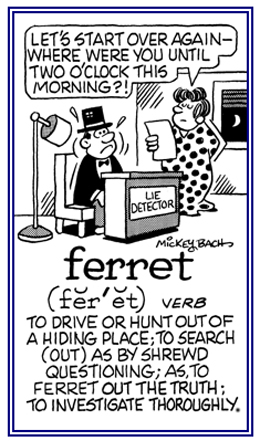2. The name for a domesticated polecat, "Mustela putorius", common in the Old World; such as Europe: The family kept their pet ferrets in a cage during the day when the members of the family were not home.
The ferret has been used for several centuries in Europe, and even earlier in Asia, to hunt rats, mice, and rabbits. The Romans were familiar with the sport, too; and Pliny states that the ferret was used in his time for rabbit hunting. Pliny the Elder, Gaius Plinius Secundus (23–79 AD) was an ancient Roman nobleman, scientist and historian, and author of Naturalis Historia, "Pliny's Natural History".
Domestic ferrets are found in many color types including albinos, brown, and black. The name is also applied to a related wild species, the North American, or black-footed, ferret, "Mustela nigripes", which inhabits the Great Plains and is now extremely rare.
Its range nearly coincides with that of the prairie dogs, which constitute most of its diet; and it is often found in prairie dog burrows.
The severe reduction of the prairie dog population by ranchers is probably partially responsible for the rarity of the black-footed ferret, although it was apparently not numerous when the West was first settled by Europeans.
Ferrets are classified in the phylum Chordata, subphylum Vertebrata, class Mammalia, order Carnivora, and the family Mustelidae (weasel family).
Marcus ferrets out the answers to computer programs and he is considered to be very good at it.
Ingrid's neighbor had two pet ferrets which he used for ferreting rabbits out of their holes in the ground on his farm.
One technique that Adam uses to ferret is by sending his small furry animal with a long tail down a rabbit hole while he holds a container to catch it as it goes out another hole in its attempt to escape.
2. Etymology: in use since about 1398, from Old French fuiret, diminutive (used to express smallness) of fuiron. "weasel, ferret"; literally, "thief"; from Late Latin furionem (related to furonem "cat", and also "robber"); probably from Latin fur, furis, "thief".The verb (from about 1450) refers to the use of half-tame ferrets to kill rats and flush rabbits from burrows; and the extended sense of "to search out, to discover" is from about 1580.

